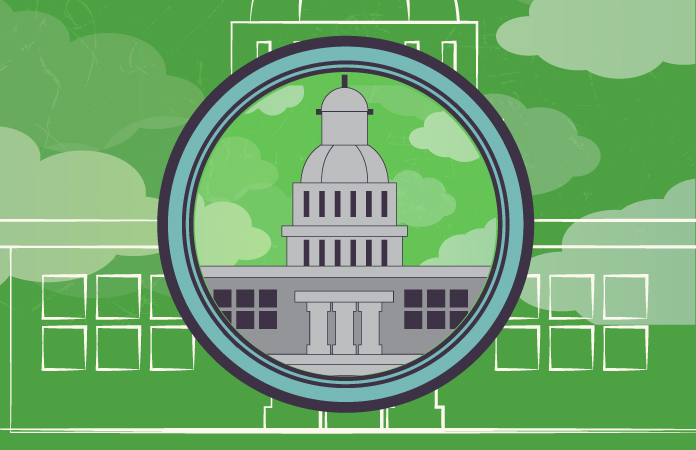
Session activity is winding down as the general assembly prepares to adjourn in early May. Bills are still being introduced though, and while the number of introduced bills is slimming down, there are still some heavy hitters lawmakers are trying to push through.
Introduced this week was a bill that would allow county hospitals to enter into anticompetitive agreements and shield them from state and federal antitrust laws. Also introduced this week was a bill that renewed efforts by lawmakers to introduce ranked-choice voting.
In a possible reaction to the U.S. Supreme Court’s Monday certiorari grant to two appeals asking if government officials should be allowed to block people on social media accounts they operate for job-related activity, state lawmakers introduced a bill this past week that would answer the question with a “yes.” The bill introduced April 22 would allow state elected officials to block people for any reason, including bullying, harassment or intimidation, at the official’s discretion.
Bill Number: HB23-1308
Title: Access To Government By Persons With Disabilities
Introduced: April 26/23
Sponsors: D. Ortiz, J. Danielson
Summary: The bill would require state and local public bodies, including the general assembly and political parties, to comply with certain accessibility requirements within specified periods. The bill would cover access ballots, providing auxiliary aids and services, allowing video conferencing platforms in court proceedings, livestreaming public meetings and ensuring the state capitol building is navigable via an audio and way-finding program.
Bill Number: SB23-298
Title: Allow Public Hospital Collaboration Agreements
Introduced: April 25
Sponsors: B. Gardner, D. Roberts, K. McCormick, R. Bockenfeld
Summary: The bill would permit a county or health service district and affiliated hospital with fewer than 50 beds to enter into agreements that may be anticompetitive. The bill would exempt collaborating hospitals from state antitrust laws and provide immunity from federal antitrust laws under the state action doctrine for approved activity.
Bill Number: SB23-299
Title: Epinephrine Auto-injectors At Institutions Of Higher Education
Introduced: April 25
Sponsors: L. Cutter
Summary: The bill would require each higher education institution to acquire and stock a supply of epinephrine auto-injectors in each student housing facility and cafeteria. The injectors are used for people who are experiencing severe or life-threatening allergic reactions.
Bill Number: SB23-301
Title: Voting In Presidential Primary Elections
Introduced: April 25
Sponsors: J. Bridges, C. deGruy Kennedy, M. Soper
Summary: The bill would require that in presidential primary elections, beginning with the 2028 presidential primary election, electors rank their top five choices. Each ballot would count as one vote for the highest-ranked active candidate on that ballot. Votes would be tabulated in rounds until two or fewer active candidates remain. Votes cast for a candidate who withdraws their candidacy for president of the U.S. and votes cast for a candidate with the fewest votes in a round of tabulation would be transferred to the elector’s next highest-ranked active candidate on the ballot. Ties would be determined by lot.
Bill Number: HB23-1305
Title: Continue Health Benefits In Work-related Death
Introduced: April 22
Sponsors: S. Bird, R. Bockenfeld, R. Zenzinger, B. Kirkmeyer
Summary: Among other provisions, the bill would eliminate the requirement that an employer must contribute to a police officer’s and firefighter’s continuation of benefits fund to have the benefits continue for dependents of a police officer or firefighter who died in a work-related death.
Bill Number: HB23-1306
Title: Public Use Of Elected Officials’ Social Media
Introduced: April 22
Sponsors: L. Herod, M. Soper
Summary: The bill would allow an elected official in the state to block individuals from interacting with social media accounts used by the elected official for any reason, including bullying, harassment or intimidation, at the elected official’s discretion.
Bill Number: HB23-1307
Title: Juvenile Detention Services And Funding
Introduced: April 22
Sponsors: L. Daugherty, M. Soper
Summary: The bill would require the general assembly to appropriate $3,340,119 to the Department of Human Services in each fiscal year for services for youth who can be placed in lieu of detention.
Bill Number: SB23-296
Title: Prevent Harassment And Discrimination In Schools
Introduced: April 21
Sponsors: F. Winter, J. Marchman, J. Bacon
Summary: The bill would require confidentiality for any report received by a K-12 public school if the report alleges harassment or discrimination. The bill would require a public school to accept reports of harassment or discrimination in writing or in person or by phone, e-mail, online form or through safe2tell. Schools would also need to post notices that tell students how they can report harassment or discrimination and adopt procedures for investigating such reports. Schools would need to retain harassment or discrimination case files for seven years.
Bill Number: HB23-1303
Title: Protect Against Insurers’ Impairment And Insolvency
Introduced: April 20
Sponsors: K. Brown, J. McCluskie
Summary: The bill would amend the priority distribution of insurance claims paid from an insurer’s estate in the event of the insurer’s liquidation to include in the class 1 distribution priority payments that an impaired or insolvent insurer owes to the risk adjustment program that are necessary to prevent another insurer from becoming impaired or insolvent. This adjustment would repeal July 1, 2026.
Bill Number: HB23-1304
Title: Proposition 123 Affordable Housing Programs
Introduced: April 20
Sponsors: J. McCluskie, L. Frizell, D. Roberts
Summary: Among other provisions, the bill would modify the voter-approved affordable housing programs by allowing tribal governments to participate in the programs, subject to the same conditions for funding.

Law Week’s legislative tracking is done through State Bill, a product of our publisher, Circuit Media.

